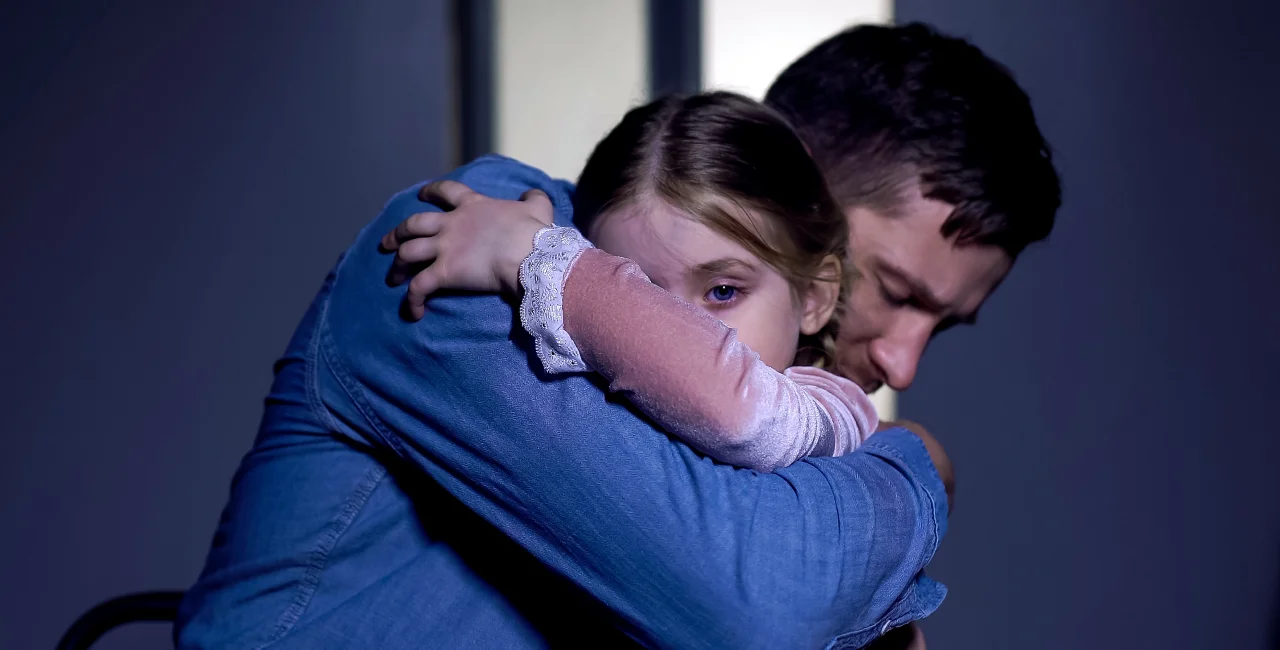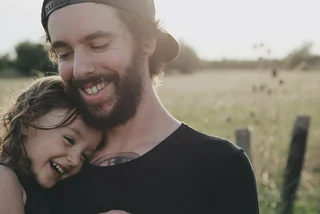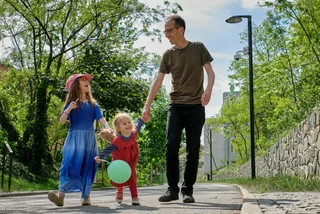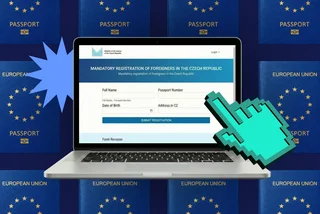Father’s Day is here in Czechia, but not all expat dads in the country will be able to celebrate with their kids. Separated from their children after complicated divorces in Czech courts, several foreign fathers have struggled with the country’s legal system during their child custody cases, leading to frustration, anger, and, in some cases, estrangement from their children.
Expats.cz reached out to several foreign fathers to discuss their personal experiences with judges and courts in Czechia during their custody cases, many of which have been particularly drawn out. Some fathers have spent years – and, cumulatively, millions of crowns – in an attempt to secure fair care for their children. We listened to their stories and their thoughts on what is amiss with the Czech justice system.
Challenges in Czech family court
Phillip*, an expat dad from the UK, shared his experience of family courts in Czechia. He believes that a Czech judge made him pay an unfair child-maintenance payment amount disproportionate to his income (*name changed to protect identity).
Phillip told Expats.cz. systemic flaws, slow processes, an outdated mindset, and favoritism towards mothers are to blame.
“The child maintenance payment I was ordered to pay was almost 100 percent of my income – I simply couldn’t afford to pay and provide for my children who lived with me half the time,” he said.
“Many of the family court judges trained during communist times and have an old-fashioned mindset. This reinforces the traditional stereotype that only the mother takes care of children while the father’s role is solely to provide financially.”
Phillip had lost his job and a new position meant he was earning significantly less than before. He was stuck paying a completely disproportionate amount compared to his income. “Compared to the UK system, there would be no need to go to court or pay for lawyers. An adjustment in maintenance would be actioned after one phone call,” he explained.
Phillip criticized the length and complexity of the legal process. After appealing his case at the Czech Constitutional Court, it was returned to the lower courts, which he claims ignored the constitutional recommendations. He is left without a clear outcome, having to appeal the decision again and wait several more months.
He also found several aspects of the case peculiar. He stated that the courts requested detailed evidence of his income, including bank statements, tax returns, and work contracts, which they seemingly ignored or dismissed. On the other hand, he felt the mother’s income was accepted at face value without any investigation or due diligence. “I felt two different standards were applied – one for fathers and one for mothers,” Phillip said.
Phillip also believes there is no appropriate filter in the Czech judicial system: there is little to no mediation before court hearings, making the process time-consuming and expensive. He thinks the court system is overused, causing delays.
“On paper, the law is fair. The application of the law in courts often does not seem to represent the law on paper,” he added. "The whole system seems designed to make it as difficult as possible for a dad who wants to fairly co-parent his child.”
Delayed hearings detrimental to children
Expats.cz also spoke with Craig*, a British expat who went through a lengthy and highly controversial court process (*name changed to protect identity).
“Although by law it should take six months for a district court to issue a decision [on custody], it took the judge over four years,” explained Craig. Unfortunately, the length of time for the decision was the tip of an iceberg of issues in his custody case.
Craig’s assigned judge was Kamila Petrusová, who has presided over child custody cases for several years. His experience, however, was far from positive.
“In the first hearing she was nice and understanding, but then she was a completely different person in the second, and in the following five years,” Craig explained.
ONLINE SUPPORT FOR FATHERS
Phillip and other dads we spoke to mentioned the Dads in Prague Facebook group, which discusses a wide range of parenting topics, including advice on family court issues, as a helpful resource for those in a similar situation.
According to Craig, Petrusová dramatically changed her opinion and acted “like she didn’t know the case.” Craig stated: “She would scream at me and my lawyer and threaten to fine us CZK 50,000 for asking why there were so many delays.”
Several aspects of Craig’s case were problematic. He claimed that video camera evidence of the mother’s physical violence against him was dismissed in court. “She ordered me to stop using cameras,” Craig said.
Judges in Czechia are independent and free from strict oversight, giving them significant discretion in their actions.
Lawyer Lucie Martin-Nešporová of Law Office Prague, who represents a father involved in a Czech custody case, told Expats.cz that a judge should do everything to bring a recently divorced, emotional couple to an agreement by assessing all factors impartially.
“Instead, Judge Petrusová would refuse to record what I said in court hearings – which is constitutionally illegal – and unjustly threatened to end hearings early,” Martin-Nešporová said. The lawyer also stated that the judge inexplicably delayed hearings, which was detrimental to parents and children.
A triumph followed by a setback
Last May, Craig appealed to the Constitutional Court against Petrusová’s rulings. The court dismissed all of her decisions and granted 50-50 joint custody. Craig mentioned that the Prague 6 District Court president was “astonished” when Petrusová, in her defense, said that her legal actions had “no consequences.” Expats.cz reached out to Petrusová and her legal team, who have yet to respond.
Craig also alleged that Petrusová and a worker from the Czech Child Social and Legal Protection Authority (OSPOD) attended his child’s school unannounced and interviewed them, which he says should never have happened. Consequently, the time Craig could spend with his children was reduced.
Craig believes the Constitutional Court decision set a new precedent for fathers’ rights in the Czech Republic. As a result, he feels ecstatic about being able to help other Czech fathers. He contends that foreign fathers are at a disadvantage, as Czech mothers are shown favoritism by the Czech family-law judicial system.
He also criticized the OSPOD for complicitly working with the mother and judge by demanding that a letter from a social worker informing the judge of the mother's bad behaviour be withdrawn.
Despite the Constitutional Court’s decision, Craig is now facing another trial with the same judge. He criticized the OSPOD for allegedly working with the mother and judge by demanding the withdrawal of a letter from a social worker informing the judge of the mother's bad behavior.

Systemic flaws need 'urgent reform'
Expats.cz spoke with Frederico, a Portuguese father who faced significant challenges navigating the Czech family court system after his separation. He alleges a series of troubling experiences he believes are indicative of systemic biases within the Czech justice system.
Frederico shared his frustration with the handling of his case, particularly concerning the relocation of his children by his ex-wife using allegedly fraudulent documents: “My ex-wife criminally abducted my children when she illegally relocated them to her parent’s home six months after our separation. She got away with it by using government-issued fraudulent documents she obtained unilaterally despite having no legal right.”
He described his interactions with Judge Petrusová, claiming she dismissed his concerns about the documents: “The judge said verbatim: ‘The mother would not lie to the court, so I don’t need to look at the documents.’”
The Czech state has, in effect, criminally helped my ex-wife legitimize the abduction of my children.”
Frederico criticized the prolonged legal process and perceived delays in issuing a custody verdict: “Although Czech law mandates a custody decision within six months, it took much longer. I believe the judge deliberately delayed proceedings to give my ex-wife time to resettle the kids there.” He expressed anguish over losing custody and having limited access to his children for six of the last eight years.
Regarding child support payments, Frederico asserted they were unfairly determined: “I was made to pay what I consider to be excess child support payments – totaling over half a million crowns – that were ‘invented’ by the judge and not legally applicable.”
Frederico also raised concerns about the Office for Social and Legal Protection of Children (OSPOD), alleging improper conduct during proceedings: “An OSPOD worker stood in court and blatantly lied to a judge's face, alleging my children were ‘suffering’ from my lack of payments, which was not true.”
He emphasized the broader implications of his case: “The Czech state has, in effect, criminally helped my ex-wife legitimize the abduction of my children. I believe these issues indicate systemic flaws within the Czech family court system that need urgent attention and reform.”
'Traditional mindset and culture' influence custody hearings
Jesse, a Spanish-American father, contacted Expats.cz to share his experience, which echoes those of many other expat fathers.
While living in Spain, Jesse claims that his ex-wife took their children to Czechia without his consent. He filed for custody at a Czech district court, expecting a decision within the legally mandated maximum of six months. However, the process extended to three and a half years.
“What is written in Czech law [about the maximum six-month time period] is not what judges actually follow. If the judge doesn't deliver a verdict in six months, there is no punishment for this,” he told Expats.cz.
Jesse asserts that the judge dismissed evidence regarding the alleged abduction, including a documents from a Spanish court that classified his ex-wife's actions as criminal.
“Many judges believe that children should be with their mother simply and solely because she gave birth to them. They say they are acting in the ‘best interests of the children,’ but they are just protecting themselves,” he added.
Jesse also alleges that a social worker from the OSPOD secretly collaborated with his ex-wife. He claims that the judge, social worker, and an expert met without the parents and their lawyers, which he says is illegal. Additionally, Jesse contends that the judge withheld letters from his daughter as evidence despite his legal right to view them upon request.
“Czechia’s ‘traditional’ culture and mindset influence the judicial system, which – with respect to family law – is about 20 years behind other European countries like the UK.”
According to Jesse, who spent CZK 1.3 million on legal fees, the judge ignored a psychiatric assessment. He states that if the therapist recommended shared custody or found him suitable for shared custody, the judge would disregard this and seek contrary evidence.
Jesse also claimed that the judge and social worker visited his child’s school and told his son, without his knowledge, “If you don’t choose to stay with your mother, you will end up in foster care.” He believes there is too much protection for the judge and social worker: "Everything is built on protecting the honor of the judge," he stated.
Lawyer Jiří Buchvaldek of the Hrubý & Buchvaldek law firm, who represents Jesse, stated that he believes Judge Petrusová broke the Czech Code of Civic Judicial Procedure by making a surprise visit to a child’s school to interview them without giving prior notice to the parents and by meeting ex partes with the expert witness. He called Petrusová’s actions “unprofessional.”
Punishment delivered – but is it enough?
The Supreme Administrative Court recently officially disciplined Petrusová of Prague 6. In an April hearing, the court ruled that she “did not keep her emotions in check, did not allow all parties to comment on a case, refused to record all proceedings properly, and repeatedly threatened to impose fines and adjourn hearings.”
“[She] abused her position to the point of not leading the parties to resolve the matter. Rather, it appeared that she enjoyed her power,” NSS court chairman Petr Mikeš ruled in April. She was fined one month’s salary. This is not the first time Judge Petrusová has faced complaints: during her tenure as Prague 6 District Court judge, 20 complaints were filed against her, seven of which were justified.
In her defense, Judge Petrusová cited a high caseload and limited time, asserting that she always tried to act in the child's best interests. However, parents like Frederico and Jesse believe she should be stripped of her judicial powers. “She should not preside over proceedings that determine the future wellbeing of children,” Frederico said, adding that he has signed a petition by those affected by what he describes as the incompetence of the Czech courts and Judge Petrusová in particular.
Buchvaldek believes that all judges in custody cases must be "firm and impartial in their behavior; clearly inform both sides upfront what he/she expects them to present; and have the ability to distinguish between important facts and irrelevant information." He also adds that "delays in the decision process can sometimes cause more damage than a bad decision itself."
The affected fathers each have different experiences but share a common sentiment: a feeling of mistreatment by the Czech judicial system. They feel that ingrained bias against men and foreigners in Czechia, coupled with a preference towards Czech mothers and drawn-out processes, creates significant challenges for expat dads in custody proceedings.
Some argue that a generational change and a more modern mindset are needed to bring Czechia’s judicial system in line with other EU countries regarding family law.
Expats.cz reached out to Judge Petrusová and her legal team, who have yet to respond.












 Reading time: 10 minutes
Reading time: 10 minutes 























